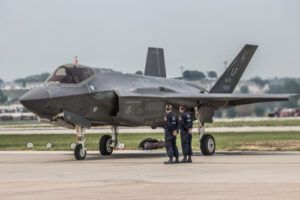
The U.S. Senate annual defense package under consideration includes several provisions from U.S. Sen. Deb Fischer (R-NE), including to overhaul American nuclear preparedness and reinforce the nation’s deterrence against foreign adversaries.
“A dangerous world demands a strong investment in our military, and that’s what our defense bill delivers, both for Nebraska and the country as a whole,” Sen. Fischer said on June 18. “I fought for several sorely needed changes that will fortify America’s nuclear defenses, which risk falling behind adversaries like China.”
Sen. Fischer specifically secured key provisions from her Restoring American Deterrence Act, S. 4177, in the Senate’s National Defense Authorization Act (NDAA) for Fiscal Year 2024, which also includes several of her Nebraska military construction (MILCON) priorities, as well, according to her staff.
“The bill also includes my provisions for essential weapon systems, like the submarine-launched cruise missile,” said Sen. Fischer. “Finally, this year’s defense bill authorizes my requests for Offutt Air Force Base, including updates to the Weather Wing and STRATCOM.”
For instance, the bill includes full authorization for two Nebraska MILCON requests she made for an additional $158 million for the planning and design of the Survivable Airborne Operations Center facilities at Offutt Air Force Base, and an additional $6 million for the planning and design of a Consolidated Training Complex/Professional Development Center at the base, according to a summary provided by her staff.
Among several other provisions secured by Sen. Fischer is one that would authorize $5 million for STRATCOM’s NC3 Nuclear Enterprise Center’s network sensor demonstration, and another seeking $5 million for Weather Wing research and development projects, all at Offutt, the summary says.
Among several of Sen. Fischer’s provisions from S. 4177 included in the Senate NDAA is one to require that the U.S. Department of Defense develop strategies responding to possible threats from U.S. adversaries, including an assessment of the nuclear weapons necessary to implement that strategy, and another that would charge the U.S. Secretary of Defense and chairman of the Joint Chiefs of Staff with developing a comprehensive missile defense architecture.



